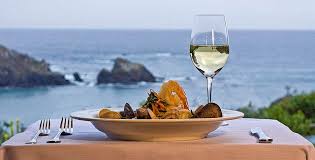South Africa’s diverse landscapes and rich coastal waters create the perfect environment for exceptional seafood, world-class wines, and fresh produce that rivals the finest culinary destinations worldwide. From the cold Atlantic waters to the warm Indian Ocean, and from the fertile winelands to abundant farmlands, South African cuisine celebrates the bounty of land and sea.
“African décor reflects harmony with nature which is reflected in its materials.”
Jane Cooper
South African Seafood: Ocean to Plate Excellence
The South African coastline stretches over 3,000 kilometers, offering an incredible variety of fresh seafood that defines coastal cuisine. Cape Town seafood markets and fishing harbors supply restaurants and homes with daily catches that showcase the country’s maritime heritage.
West Coast Rock Lobster remains one of South Africa’s most prized seafood delicacies. Known locally as crayfish, this sweet, succulent crustacean thrives in the cold Atlantic waters and appears on menus from casual seafood shacks to fine dining establishments. The West Coast rock lobster season runs from November to April, making it a seasonal treasure that seafood lovers eagerly anticipate.
Line Fish caught using sustainable fishing methods represents the pinnacle of South African seafood. Species like yellowtail, snoek, kabeljou (kob), and Cape salmon feature prominently in traditional recipes and contemporary cuisine alike. These fish are caught fresh daily and appear on restaurant menus as grilled fillets, smoked delicacies, or traditional Cape Malay curries.
Abalone, known locally as perlemoen, represents luxury South African seafood. This marine snail, harvested from cold Atlantic waters, commands premium prices internationally and appears in high-end restaurants as tender, buttery medallions.
Mussels and Oysters from Saldanha Bay and Knysna provide affordable yet luxurious seafood options. South African mussels are plump, sweet, and sustainably farmed, while Knysna oysters are celebrated for their clean, briny flavor that reflects the pristine estuarine waters.
South African Wine: World-Class Excellence
South African wine has earned international acclaim, with the Cape Winelands producing exceptional vintages that pair perfectly with local seafood and fresh produce. The country’s wine regions benefit from diverse microclimates, ancient soils, and centuries of winemaking expertise.
Stellenbosch Wine Route showcases bold reds, elegant whites, and everything between. Stellenbosch Cabernet Sauvignon and Bordeaux blends demonstrate the region’s terroir, while Stellenbosch Chardonnay and Sauvignon Blanc complement seafood dishes beautifully.
Franschhoek, known as South Africa’s food and wine capital, produces exceptional sparkling wines using traditional Champagne methods. Franschhoek Cap Classique offers elegant bubbles perfect for celebrations or pairing with oysters and line fish.
Constantia Wine Valley, South Africa’s oldest wine region, produces world-renowned dessert wines alongside crisp Sauvignon Blanc that pairs exceptionally with fresh seafood. The cool climate and proximity to the ocean create ideal conditions for white wine production.
Hemel-en-Aarde Valley near Hermanus has become synonymous with South African Pinot Noir and Chardonnay. These cool-climate wines offer elegance and complexity that rival European counterparts, making them perfect companions for sophisticated seafood preparations.
Fresh Produce: Farm to Table Abundance
South Africa’s agricultural diversity provides year-round access to fresh produce that inspires chefs and home cooks alike. From the fertile Garden Route to the arid Karoo, each region contributes unique flavors to South African cuisine.
Citrus fruits from Limpopo and the Eastern Cape supply domestic and international markets with sweet oranges, tangy lemons, and aromatic naartjies. These fruits add brightness to seafood dishes and feature in traditional South African preserves.
Stone fruits including peaches, plums, and apricots from the Western Cape orchards peak during summer months. These fresh fruits appear at farmers markets, roadside stalls, and fine dining restaurants, celebrating seasonal South African produce.
Indigenous vegetables like wild asparagus, waterblommetjies (Cape pondweed), and veldkool showcase South Africa’s unique botanical heritage. These traditional ingredients appear in contemporary restaurants, connecting modern cuisine with historical foodways.
Herbs and Microgreens from urban farms and peri-urban gardens supply restaurants with aromatic flavors. Fresh herb gardens featuring indigenous varieties like wild garlic and African basil add distinctive South African character to dishes.
Artisanal Cheeses from small-scale dairies across South Africa complement wine tastings and create perfect cheese boards. South African cheesemakers craft everything from creamy camembert to aged cheddar, using milk from grass-fed cows and goats.
Sustainable Practices and Future-Forward Thinking
South African producers increasingly embrace sustainable fishing, organic farming, and ethical production methods. SASSI (Southern African Sustainable Seafood Initiative) guides consumers toward responsible seafood choices, while organic certification and biodynamic farming protect South Africa’s agricultural future.
Experience the Best of South African Cuisine
Whether enjoying grilled line fish with Stellenbosch Sauvignon Blanc, savoring West Coast rock lobster with Cap Classique, or exploring farmers markets for seasonal fresh produce, South African cuisine offers unforgettable experiences. The country’s commitment to quality, sustainability, and culinary innovation ensures that every meal celebrates the journey from table to coast.
Visit local seafood restaurants, explore wine estates, and shop at farmers markets to discover why South African seafood, wines, and fresh produce deserve international recognition.




